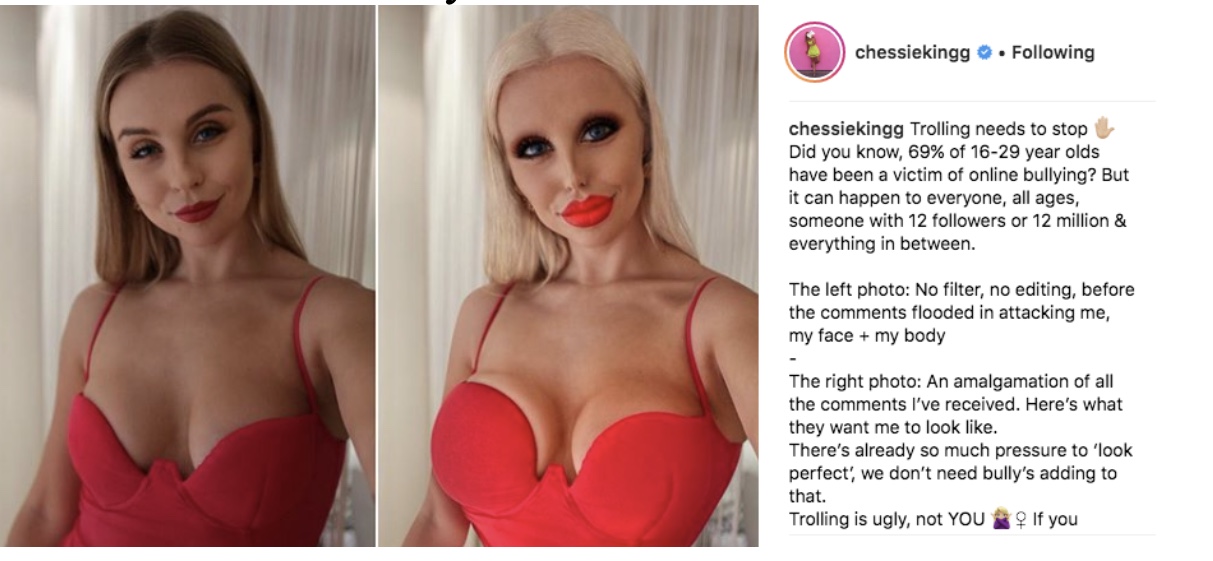#SocialMedia: The good, the bad, and the ugly
Think about it, how many times do you pick up your phone and mindlessly check Instagram? How many times do you check your timeline, only to quickly respond to a message and then refresh your feed again for the 800th time that day. Is it any wonder when there are so many accounts to follow? - all claiming to help you achieve your dream body, the ‘perfect’ job, the ‘perfect’ filtered life. We can get lost in a sea of ‘likes’ and comments for validation.
#DoItForTheGram
Picture this, you’re scrolling down your timeline on Instagram and you are bombarded by images and posts by social media influencers – their message is one that seems simple enough: be yourself, love your body, embrace your flaws. Most of the time these images that are highly edited and perfectly poised often depict an unrealistic standard of beauty. Interestingly, free apps that can manipulate your body or face seem to be one of the most popular editing apps to download.
The younger generation base a lot of their thoughts, feelings, and emotions on what they see online, and can we blame them? This is where the younger generation spend most of their time. This is where they can see inside a celebrity or influencers life, where more often than not the way you look warrants sponsorship deals, free products, and the idea of a lavish, easily attainable life.
Mental health week spiked up a debate as to whether social media is detrimental to teens. A lot of Instagram influencers would proceed to post pictures of their lavish lifestyles with an inspirational caption. In turn, a lot of them were criticised for not actually taking the aspect of mental health seriously and were actually adding to the increasing problem.
Nowadays, there is an obsession with posting the ‘Perfect Selfie’ and our society is inundated with images that are meant to sell us a product, brand, or lifestyle. Is it any wonder that when we look at our own lives and they do not quite fit into the backdrop of an ‘Instagram’ filter, we see our own accomplishments fall short? Does my edited image or heavily filtered photo make me more of a marketing tool? We are so spoilt with everything being so easily accessible and on demand all of the time that we can sometimes forget to connect with reality and appreciate what it takes to be ‘alive’, in a world consumed by virtual reality and refreshed timelines.
This ideal can be detrimental to our teens that seem to live their lives on a social platform often doing things or posting content purely for ‘likes’ and doing it #ForTheGram’. There seems to be a conflicting message across most influencers, ‘be confident, love yourself, but that’s only okay if you fit into the mould and the standards of what society deems beautiful.’ If we can manipulate our images so easily, do we lose touch with reality? And constantly chase impossible and unrealistic #Goals.
It must be difficult and confusing for our future generation to receive such mixed signals and it’s hardly surprising that the youth of today set such high standards for themselves and anxiety and depression in teens has increased drastically, ‘Anxiety disorders are the most common of all mental illnesses and affect 25 percent of all teens and 30 percent of all teen girls.’ Even teenagers that don’t necessarily want to engage in social media can feel the pressure of having to keep up with the latest social trends in order to fit into conversation with their peers.
It isn’t all doom and gloom though, there are a lot of positive messages that can come from social media and we can see the sense and the shift occurring. Influencers such as Chessie King, who set up an Instagram campaign about cyber bullying and internet trolling, edited an image of herself but edited it using comments her trolls had left her on her page. She did so to highlight the detrimental effect that cyberbullying can have on people, especially teenagers, and shared the ‘beauty ideal’ with her followers:
If she had listened to all of the comments she had received from people, the picture on the right would have been what society deemed ‘perfect’. When in fact it is is unrealistic, fake and resembling more of a video game than a human being.
Ashley Graham is also seen to be changing and shifting the paradigm. She frequently promotes unedited photos and is actively trying to make a difference to the way we see images, and is constantly promoting body positivity, as shown below. Graham decided to use unedited shots to promote her new swimsuit collection. This received so much positive feedback, but why is a raw unedited image such a surprise? Why is it shocking to see a woman in a swimming costume with cellulite?
So how can we as teachers, parents, and educators protect and encourage the future generation? There are lots of positives that can come from engaging with our teens through the power of social media. If we look at platforms such as Instagram, SnapChat, Facebook, etc. as a positive outlet and more as a space where creativity is encouraged and self awareness is to be explored, we can promote things that are important and that relate to them as a community. It would be a great way to speak to our young minds and hopefully better understand the challenges that they face, subsequently adapting our teaching styles and curriculum to connect with what they know and understand.
There is a lot of help available for those who feel they are subjected to online abuse. Bullying UK has fantastic resources and advice on how to stay safe online, if you feel like you may know somebody struggling with their self image there is also an anxiety UK website that allows you to become a member. There is so much support on social channels, that we don’t focus on enough, that depicts all the good that social media and internet platforms can bring.
Once you learn to be happy, you won’t tolerate being around people who make you feel anything less.



